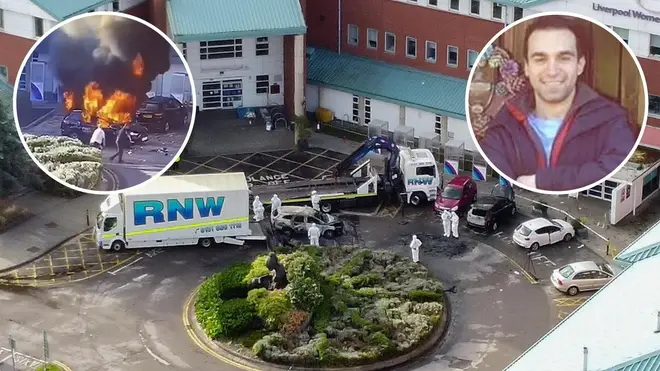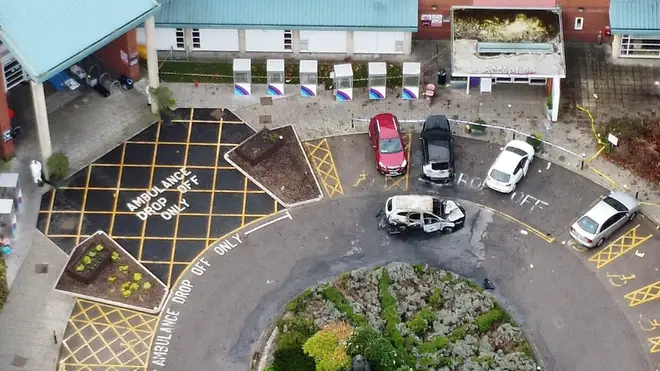
Vanessa Feltz 3pm - 6pm
30 December 2021, 11:24 | Updated: 30 December 2021, 15:19

The Liverpool hospital bomb attacker died from an explosion and fire caused by an improvised explosive device he designed with "murderous intent", a coroner has found.
However, it remains unclear whether Emad Al Swealmeen meant for the device to set off when it did on Remembrance Sunday - and officers are still investigating what his intention was.
He travelled in a taxi, which caught on fire in the car park of a hospital in Liverpool. Nobody else died in the incident.
However, an inquest on Thursday heard despite months of planning, Al Swealmeen was not on the radar of security services.
Speaking at Liverpool and Wirral Coroner's Court, senior coroner Andre Rebello said: "On November 14 2021 Emad Jamil Salman Al Swealmeen died in a taxi in front of Liverpool Women's Hospital.
"He died from an explosion and subsequent fire caused by an improvised explosive device which he had carried into the taxi.
"It is found he manufactured the improvised explosive device, designed to project shrapnel, with murderous intent."
Read more: Liverpool bomber had been buying parts for device for last 7 months, police say

Read more: Christian convert receives death threat following Liverpool Poppy Day attack
The device, was put together in a flat in Rutland Avenue he used as a "bomb making factory". It was about a mile and a half from Liverpool Women's Hospital.
Al Swealmeen, 32, was born in Baghdad, the capital of Iraq, and had been imprisoned in the Middle East for a serious assault. He had also been convicted of possession of an offensive weapon in Liverpool.
He had falsely claimed he was of Syrian heritage in asylum applications and was still a practising Muslim despite converting to Christianity, the inquest was told.
It was suggested at the inquest by doing so he may have tried to strengthen his asylum claims, with the risk of persecution on return to Syria or Iraq increasing if he was a Christian convert.
He had come to the UK legally, using a Jordanian passport and British visa, though his asylum requests were repeatedly turned down, most recently in November 2020.
The inquest heard Al Swealmeen called his brother, who lives in the US, two days before his death.
Mr Rebello said: "He says towards the end of the call Emad said something like 'if I do something bad that will affect the family what do you think?'
"He replied something like 'don't do s***', advising him as an older brother, although this was something which caused him concern, knowing his previous issues."
He added: "It remains unclear as to whether he intended the device to detonate when it did."
During the inquest Detective Chief Inspector Andrew Meeks said there was no evidence to suggest anyone else had been involved with obtaining materials for the device or its construction but investigations were continuing.
Previously, police said Al Swealmeen had bought parts for a homemade bomb over the course of seven months.
The inquest heard how on the day of the attack, taxi driver David Perry, later hailed as a hero, approached Rutland Avenue in his vehicle.
Read more: Liverpool bomb could have caused 'significant injury or death', police say

Liverpool Metro Mayor reflects on Poppy Day bomb
Mr Perry described a male exiting the house and walked around the back of the car into the rear passenger seat.
Mr Rebello said: "The only words he spoke were 'Women's Hospital' in what Mr Perry describes as a foreign, Middle Eastern accent."
The inquest heard the journey to the hospital was "uneventful", but as he stopped the vehicle "it felt like a wagon had crashed into the back of the car".
Mr Perry blacked out for several seconds, Mr Rebello said, before regaining consciousness and seeing smoke.
Mr Perry managed to escape the car in the seconds following the device detonating.
The taxi driver staggered out of the car and a man wearing a high-vis jacket came towards him. The inquest heard Mr Perry said "the b******* tried to bomb me."
He suffered three fractures to the lower back and eardrum damage in the incident.
The explosion propelled ball bearings used in the making of the device into the car, and caused the front windshield to travel 16 metres away from the vehicle.
A call was made to Merseyside Police at 10:58am, stating a vehicle had exploded outside the entrance to the hospital, and the passenger was deceased.
Read more: 'Vile': Tory councillor apologises for Jeremy Corbyn Liverpool bomb attack tweet
Al Swealmeen was later identified by records on police systems.
He had been assessed over five months in 2015 under the Mental Health Act, and was prescribed medication for low mood by his GP.
Mr Rebello said: "One thing that struck me was this lone actor from a disrupted family, with a bit of a chaotic background, could well have killed many, many innocent people and there doesn't appear to have been any opportunity to have detected this was about to happen.
"It is something that has been planned over many, many months.
"Clearly, from what he said to the family, he had something in mind and yet this was hidden from everybody."
The coroner added of Mr Perry: "I suppose he is probably one of the unluckiest taxi drivers around and yet possibly one of the luckiest given what could have been."
Detective Chief Inspector Andrew Meeks confirmed Al Swealmeen was not on the radar of security services.
He added police are still investigating the intentions of Al Swealmeen's actions.